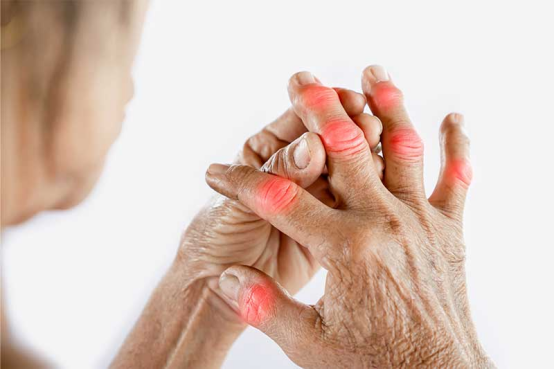
If you or a loved one has recently been diagnosed with psoriatic arthritis (PsA), you might be wondering about the available treatment options. While there is no cure for psoriatic arthritis, there are several treatments that can help reduce common symptoms such as swelling, stiffness, and joint pain. From medications like NSAIDs and biologics to natural remedies and lifestyle changes, here are common treatments for PsA.

Note: Always consult with your doctor before starting any treatment.
Medications for Psoriatic Arthritis
NSAIDsNonsteroidal anti-inflammatory drugs (NSAIDs) are commonly used to alleviate the pain and discomfort associated with psoriatic arthritis. They help reduce musculoskeletal symptoms, minimize swelling, relieve pain and morning stiffness, and improve joint mobility. For mild cases, NSAIDs might be the only required medication. Over-the-counter NSAIDs include ibuprofen (Advil, Motrin IB) and naproxen (Aleve), with stronger versions available by prescription.
SteroidsCorticosteroids can also reduce swelling and pain in psoriatic arthritis. In some cases, steroids may be injected directly into an affected joint. They can also be taken orally to manage inflammation and pain. However, long-term use of oral steroids is not recommended due to potential significant side effects.
DMARDsDisease-modifying antirheumatic drugs (DMARDs) are another common treatment for psoriatic arthritis. DMARDs work by targeting the underlying immune response that attacks healthy joint tissue. They help reduce inflammation, slow the progression of PsA, and prevent joint damage. DMARDs include methotrexate (Trexall, Otrexup), leflunomide (Arava), sulfasalazine (Azulfidine), azathioprine (Imuran, Azasan), and cyclosporine (Gengraf, Neoral, Sandimmune). These drugs are usually taken orally, and it may take several weeks to see results, so continued use is necessary even if immediate relief isn't noticeable. Side effects can include bone marrow suppression, liver damage, and increased infection risk.
Other MedicationsPhosphodiesterase 4 (PDE4) inhibitors, such as apremilast (Otezla), are approved for patients who have not responded adequately to previous DMARDs. This oral medication works by reducing the activity of an enzyme that causes inflammation.
BiologicsBiologics are a newer treatment that targets specific molecules in the immune system responsible for PsA. They are generally used for severe cases or when other treatments have failed. Biologics can be injected or given intravenously and may be used alone or with traditional DMARDs. Common examples include adalimumab (Humira), abatacept (Orencia), infliximab (Remicade), certolizumab (Cimzia), etanercept (Enbrel), tofacitinib (Xeljanz), golimumab (Simponi), ixekizumab (Taltz), secukinumab (Cosentyx), and ustekinumab (Stelara). Side effects can include liver or kidney issues, so regular blood or urine tests are recommended. Biologics typically require at least three months of use before determining their effectiveness.
Non-Pharmacological Treatments
Lifestyle ChangesAdopting a healthy lifestyle can help manage PsA symptoms:
- Weight Management: Maintaining a healthy weight can reduce stress on joints, and weight loss may alleviate joint pain in those who are overweight.
- Exercise: Regular light exercise helps maintain joint flexibility and strengthens supporting muscles. Exercise can also reduce inflammation, boost energy, and improve mood.
- Nutrition: A balanced diet provides essential nutrients for joint health. Diets low in processed and fatty foods have shown benefits for various health conditions.
- Smoking: Smoking increases body inflammation and may worsen PsA symptoms while reducing the efficacy of certain medications.
- Alcohol: Alcohol can exacerbate symptoms and may interact poorly with certain medications.
Physical TherapyPhysical therapy can be beneficial in maintaining joint flexibility and enhancing muscle strength.
Home AidsUsing assistive devices like jar openers can help reduce joint strain and support independence.
Stress ManagementHigh levels of psychological stress can negatively impact physical health. Engaging in activities such as yoga, meditation, and mindfulness can be beneficial.
Surgery
For severe PsA cases, doctors may recommend surgery to replace damaged joints with artificial ones.
Alternative Therapies
Although clinical evidence for these treatments is limited, they are generally considered safe and may improve overall health:
- Turmeric: Curcumin, a natural compound in turmeric, is known for its anti-inflammatory properties.
- Epsom Salts and Hydrotherapy: Hot baths and Epsom salts have been used for centuries to relieve joint stiffness and stress.
- Massage: Massage can relax tight muscles around painful joints, but direct pressure on the affected areas should be avoided.
Resource Links:
- “Psoriatic Arthritis” (MedlinePlus)
- “How to Treat Psoriasis” by the National Psoriasis Foundation
- “Psoriatic Arthritis” by the National Institute of Arthritis and Musculoskeletal and Skin Diseases
- “Psoriatic Arthritis: Diagnosis and Treatment” (Mayo Clinic)







